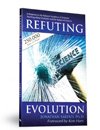
|
Refuting Evolution
by Dr Jonathan Sarfati
Navigation
Study Guide
Table of Contents
Chapter 1
Facts & Bias
Chapter 2
Variation and Natural Selection Versus Evolution
Chapter 3
The Links Are Missing
Chapter 4
Bird Evolution?
Chapter 5
Whale Evolution?
Chapter 6
Humans: Images of God or Advanced Apes?
Chapter 7
Astronomy
Chapter 8
How Old Is the Earth?
Chapter 9
Is the Design Explanation Legitimate?
Chapter 10
Conclusion
Lesson 1
Chapter 1: Facts & Bias
Discussion questions:
-
Explain 'naturalism'. Explain 'humanism'. Explain 'evolution' (in the
fish-to-philosopher sense). What is the relationship between naturalism,
humanism, and evolution?
See: -
Why is it incorrect to say 'evolution deals with science, while creation
deals with religion'?
See: -
How would Darwin's ideas enable people to be 'intellectually fulfilled
atheists'?
See: - Why would it be important to some evolutionary leaders that evolution be seen as 'compatible with religion'?
-
In reality, why is acceptance of molecules-to-man evolution not compatible
with Biblical Christianity?
See: - Explain the philosophical basis for modern science.
-
Choose one or two founders of modern science who believed the Bible, and
write a research paper about them.
See:- Biography Index for more information.
-
What is 'normal' (or 'operational') science? What is 'origins' science? To
which type of science does the evolutionary concept belong?
See: -
In what instances has evolution actually harmed scientific progress?
See: - Some people claim evolution is an 'essential concept' in biology. Is this true? Why or why not?

Answers
- See Q&A: Philosophy for additional information. Naturalism is the idea that denies the supernatural—nature is all there is. Humanism is the man-centered idea that believes man creates and controls his own destiny. Evolution is the idea that all life has arisen from the same source over millions of years. Each view is intertwined with the other views.
- Both evolution and creation deal with events that happened in the past—neither view can be proven, as neither can be repeated or tested.
- Evolutionary ideas provided the ability to deny that God exists, and that the material world is all there is.
- They wish to justify their compromise, and desire to draw others into accepting evolutionary ideas.
- For a variety of possible reasons, see Q&A: Compromise.
- Normal science needs an orderly world in which to operate, not one that is capricious or random. The Biblical view of the universe (that it was created by God) provides a rational explanation for the order we see today, and a basis for studying the world. See also Q&A: Science for additional information.
- Formulate your own response. See biographies for more information.
- Normal science deals with testable, repeatable events in the present, while origins science deals with events that have happened in the past. Evolution belongs under the origins science category. See Q&A: Science for additional information.
- Example: It prevented scientists from discovering uses for all the organs in our bodies, etc. See Q&A: Science for additional information.
- No, this is not true—there are many practicing scientists who don't use evolutionary ideas in their work. See Q&A: Science for additional information.

Readers’ comments
Comments are automatically closed 14 days after publication.